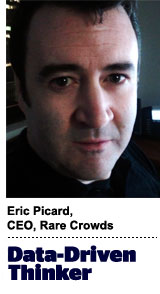 “Data-Driven Thinking” is written by members of the media community and contains fresh ideas on the digital revolution in media.
“Data-Driven Thinking” is written by members of the media community and contains fresh ideas on the digital revolution in media.
Today’s column is written by Eric Picard, CEO at Rare Crowds.
Thanks to amazing new offerings from Facebook, Google, Amazon and others on deeply connected identity and tracking solutions, we are seeing two major developments. For the first time, connected identities across entire populations are available for targeting, tracking, reporting and analytics. But these identity pools exist within walled gardens, siloed to just one provider.
From a tactical and strategic point of view, I completely understand why companies create these walled-garden identity solutions. And to some extent, they will open their walls – metaphorically allowing outside vendors and partners to enter through checkpoints, accompanied by security and wearing clearly labeled badges. Nobody can fault a company like Facebook or Google for being careful about allowing entrée to their walled gardens. The potential for a PR backlash is significant, and that could cause the overall value of their offering to decline. So yes – it’s good to be cautious.
But it does create a significant issue for every publisher outside the top five or so because their first-party data pool is limited to the activity on their own site or apps. They don’t get access to cross-site activity, nor do they have a way to compete with the efforts of the biggest players on their own. It will be hard for publishers – even the large ones – to resist the momentum that will build to plug into these walled gardens, forcing publishers to effectively commoditize themselves in exchange for access to identity, targeting and analytics data.
I’ve long been a proponent of open approaches in the ad-tech space, including open source, open architecture or open APIs. I also am a big fan of well-considered and coordinated industry or consortium efforts. I believe that efforts like OpenRTB, which is pushing for an open API standard for real-time bidding, will be key to helping the industry grow.
Open efforts like this help ensure that the biggest players don’t create huge competitive moats like we saw with paid search, where Google AdWords’ creative, functionality and APIs became the effective industry standard. As a result, any time Google makes any change, all other paid search players must immediately copy Google because of its massive dominance in this area.
Even the biggest players should support these open initiatives because regardless of any disproportionate boost one or two players may get, we’re in a massive growth phase and an open approach has proven a better way to expand industries and sectors. Building significant traction is easier with scale – and by pooling scale, the whole space has the opportunity to accelerate growth.
That said, it’s highly unlikely that Google and Facebook will take a completely open approach on their key initiatives. For one, they have enough scale to catalyze efforts and markets on their own. But more importantly, it’s not in their self-interest to be open. Remaining closed gives them opportunity to maintain control and position in the market while marginalizing smaller players in the ecosystem.
I predict that we will see more industry consortiums created around areas like identity, directly in response to the very large walled gardens that are being built now. It’s really the only way that everyone else in the industry can protect against commodification and ensure a level playing field.
Follow Eric Picard (@ericpicard) and AdExchanger (@adexchanger) on Twitter.











